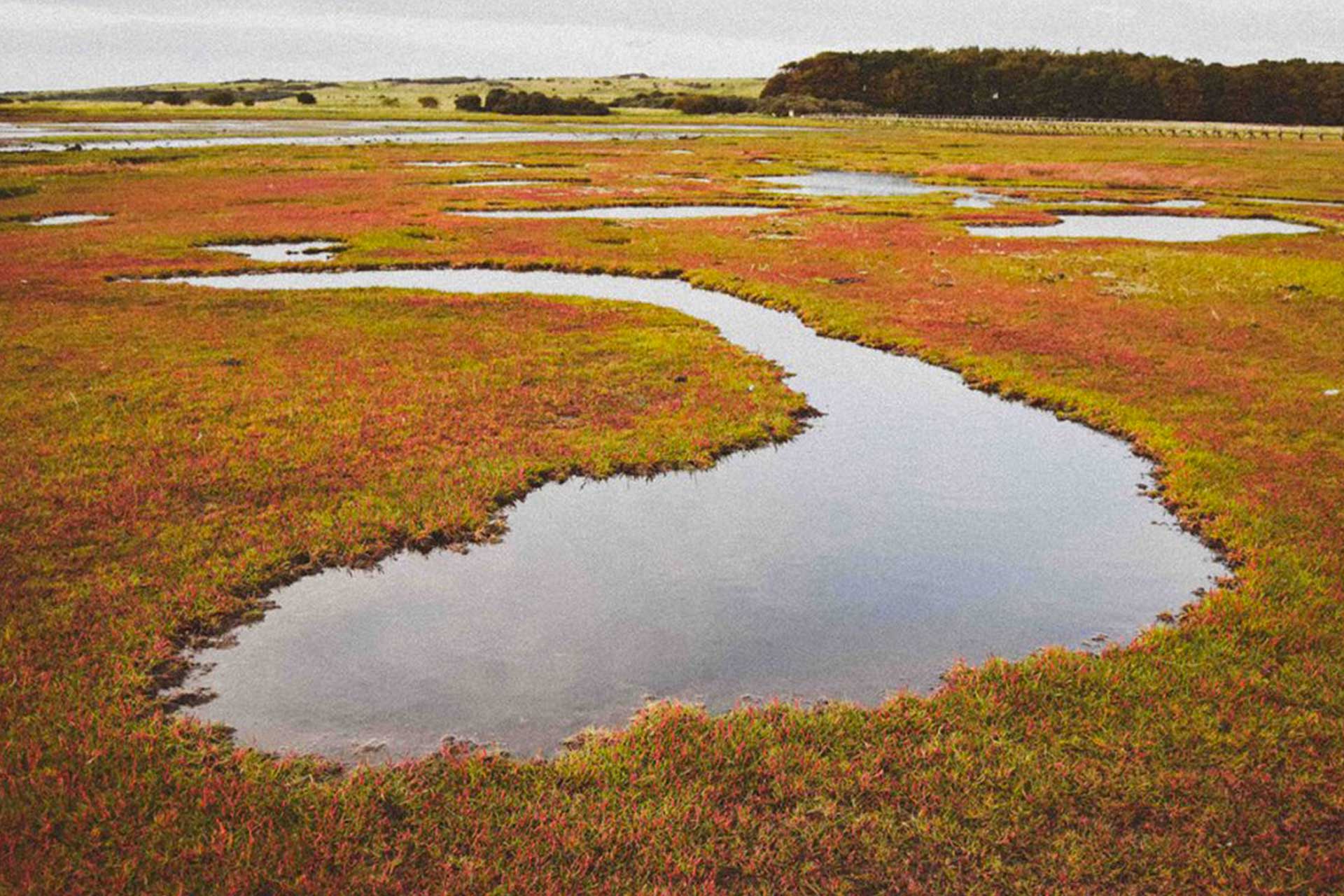When we can no longer rely on the availability of freshwater for survival, can we turn to the seas for their help?
SaltyCo – the innovation
SaltyCo has provided innovation to reduce water consumption in clothing production. The concept of developing a textile produced from salt-tolerant plants grown using seawater, came to light when Julian Ellis-Brown, Neloufar Taheri, Finlay Duncan and Antonia Contreras from the Royal College of Art, came together for a group research course. These interdisciplinary master’s students had a passion for one thing; sustainability. Their aim to disrupt the fashion/textile industry using water scarcity as their focus, instating a new textile category to the market: Freshwater Free Fabrics. Their process involves growing salt-tolerant plants using seawater (saline farming). These plants will then be harvested to extract their fibres which will be turned into textile products, using pre-existing production methods. After four months in development, gaining feedback and interest from people in the industry, they entered the Imperial Enterprise Lab’s Venture Catalyst Challenge 2020 and received a £10,000 grant to assist in the development of their sustainable textile. SaltyCo now has three products in various stages of development. Their entry fabric, which is ready to be produced as a pilot, is warm, lightweight and hydrophobic stuffing able to emulate the function and comfort of down.
Farming using seawater
The team have been working on a non-woven felt and yarns for a woven linen-like fabric that they expect to introduce to their customers once their stuffing has been released. From fibre to material, SaltyCo has to ensure that their fibres can be used in traditional production methods. For their woven fabric, the extraction method must create fibres with the correct flexural and tensile strength to be suitable for working with spinning machines and looms. Their non-woven fibres have to be compatible with air-laying and heat pressing machines to ensure strong and useful fabrics that meet the high standards of their potential clients. And these are expectations that the team have been able to meet. The potential of these materials is endless; insulated jackets, faux leather, t-shirts and trousers, all of which can be cruelty free and sustainable. «In the future we’re envisaging that our use of non-woven materials could allow us to move away from seams and thread». With an aware population, aims towards sustainability have become a need for both consumer and fashion houses. The sustainable textile industry is expanding in order to meet this demand, yet Julian identifies the barriers at play with textile innovation. «Is it scalable? Can it match the quality of other materials? Is it compatible with their current supply chains?». SaltyCo were able to work alongside companies to meet their needs and emulate traditional production techniques compatible with current supply chains. «We have scalability. We use arid land to grow the salt-tolerant crops which means that we don’t have to compete with fertile soils that are being needed for crop production. We’re already getting requests from places around the world, asking us to start integrating these farms into communities to make a localised industry».
Freshwater-free materials
There has not only been a surge in interest in the farming process of SaltyCo; fashion houses have been working alongside SaltyCo to alter the textile (and its production process) to work for them. «Neloufar sees this as the starting point for developing their sustainable freshwater-free materials. If the material works for the fashion house; if the quality is up to par, if it fits into their system, they are usually reaching out to us because they want to find an alternative. Even getting into the fashion house with just one material is beneficial; as we start producing more products, we can integrate these into their lines». These discussions within the industry has allowed the team to understand where there are gaps in the market, and how they can fill them. «We can expand towards a vegan market by providing alternatives to animal products which can all be made in a cost-effective way. We’d be able to avoid using both animal products and petrol-based products. This could create a change in the industry and really allow us to tackle a broader market that isn’t just a small sustainability market, but one that a lot of people have demand for».
SaltyCo entirely plant-based products
The US Environmental Protection Agency estimates that more than 13 million tonnes of textiles end up in landfill or incinerated. In the UK approximately 350,000 tonnes of clothes end up in landfill every year. Innovation, no matter how sustainable, could add to this figure. Yet SaltyCo are aware of these issues and are providing ways to combat this – «a lot of our waste will be biodegradable as our product is entirely plant-based» – but physical waste is not the only concern for textile innovators. With global carbon emissions on the rise, every step of production needs to be scrutinized; «in terms of other waste streams, there will be some forms of carbon use in our process, but the artificial environments that we’ll be able to create on these artificial saltmarshes will take in 50 times the amount of CO2 as an equivalent sized patch of rainforest. We’re going to be pushing that, in our life-cycle analysis, in order to reach carbon-neutral or a carbon-negative product». Clothing production, in both luxury and fast fashion, is environmentally intensive; it produces approximately 10% of global carbon emissions, and nearly 20% of wastewater. With the advent of sustainable textile start-ups, CO2 emissions have been at the forefront of discussions, yet one of the most important resources; water, is often avoided. Only 3% of the world’s water is freshwater and only 1% of that is drinkable. This finite resource is shared by 7.5 billion people around the world, and 1 in 10 of those struggles to access this basic human right.
SaltyCo
Was formed at the Royal College of Art and Imperial College London on a postgraduate masters called Innovation Design Engineering. This programme enabled the formation of a team that understands the importance of taking responsibility for a more sustainable, less wasteful world. SaltyCo prides itself on being interdisciplinary, diverse and effectively applies a wide breadth of skills from engineering through chemistry to business and design.




















